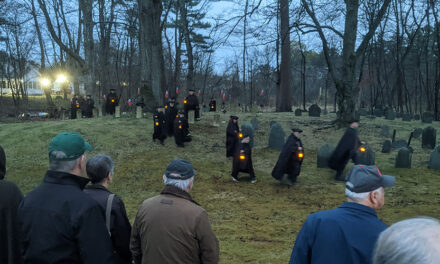Published in the May 31, 2017 edition
By MAUREEN DOHERTY
LYNNFIELD — Sometimes being the squeaky wheel pays dividends.
That’s what the residents of a South Lynnfield neighborhood discovered when they voiced their strong opposition to a proposed amendment to the city of Peabody’s zoning bylaws that had the potential to create a section of the zoning district for medical marijuana facilities accessible only through a residential Lynnfield neighborhood.
Originally, Green Street resident Danielle Berdahn held out little hope that the concerns of herself, her family and her neighbors would carry any clout after she had discovered by accident the parameters of the proposed zoning district while skimming through a newspaper.
After numerous attempts to contact Peabody’s mayor by phone, email and a personal visit to his office yielded no response, she brought her concerns to the attention of the Lynnfield Board of Selectmen.
They responded with a strongly worded letter opposing a Route 1 Peabody location of the zoning district that could only be accessed via Green Street in Lynnfield, a residential street. They requested that alternative zoning lines be drawn to ensure that areas zoned for medical marijuana would not directly abut any residential streets in either community.
Selectmen Chairman Chris Barrett delivered the letter in person at Peabody’s public hearing May 25.
Berdahn told the Villager following the May 22 meeting that she invited Peabody Mayor Edward J. Bettencourt Jr. to visit her neighborhood to see the potential impact of this zoning amendment firsthand.
Unbeknownst to either Berdahn or Barrett, Mayor Bettencourt toured the Green Street neighborhood on his own. He called Berdahn last Tuesday to let her know that he would propose an amendment to the zoning district to the City Council that would exclude the parcels on Route 1 on the Lynnfield border.
Berdahn said the mayor met with her prior to Thursday’s meeting to review his proposed amendment in detail. “He was very kind and considerate,” she said. “He said that he was happy to help and that this was the right thing to do.”
During the meeting, Berdahn said both the City Councilors and the Planning Board members were “very courteous as well,” adding that they were also “receptive to the input of Lynnfield residents, including our concerns about the billboard in South Lynnfield.”
Berdahn was allowed to testify. She told the councilors and planning board members that the original proposal for marijuana facilities in the city “would have dramatically and adversely affected the lives and homes of many decent people in Lynnfield. We all depend on a safe, stable environment to raise our families. Living with the uncertainty of people potentially getting high and driving down our streets impaired while our children play would have been agonizing for the residents of this area” in addition to its adverse effect on the character of the neighborhood and their home values.
“We appreciate that Mayor Bettencourt, the Peabody City Council and Planning Board listened to the concerns of those in Lynnfield and took action to protect the nature of our neighborhood and the well being our our families,” Berdahn told the Villager.
“The mayor was under no obligation to the residents of Lynnfield and could have ignored the opposition, but just because leaders have the power to do something doesn’t mean they should. Taking into account the marginalized residents of Lynnfield on the Peabody border speaks to the mayor’s character,” she said, adding that their partnership “gives us hope in future collaboration between the two towns.”
Barrett was elated with the cooperation displayed by Peabody officials. He posted this statement on his Facebook page: “One of the main goals of the Board of Selectmen is to be a strong voice for all of the neighborhoods of Lynnfield. To protect South Lynnfield and particularly Green Street, the Board of Selectmen voted to strongly oppose the placement of a marijuana facility at the end of Green Street.”
“I had the pleasure to speak with Mayor Bettencourt about our concerns and applaud him for proposing an amendment to remove the parcels in the zoning change that would negatively impact Green Street,” he said, “The mayor was responsive to the neighbors’ concerns and his positive response demonstrates why Peabody is so fortunate to have a mayor like him leading the city.”
Barrett followed up with a formal letter of thanks to the mayor, city council and planning board. “I have heard from many Lynnfield residents who are very grateful for your concern and support.”
Barrett said he was “happy to hear that Peabody’s elected officials are willing to take steps to eliminate the large, electronic billboard on Route 1 North that towers over homes and sheds light in the windows of the Green Street neighborhood and beyond.” Barrett stated that both he and the town of Lynnfield are “ready to offer any assistance in the matter.”
Perseverance paid off
Berdahn’s experience in this matter restored her faith in the process that united a neighborhood with their elected and appointed officials in what many had prematurely determined to be a lost cause.
She was especially grateful to those who helped “champion” this cause, including the efforts of state Rep. Brad Jones, T.A. Jim Boudreau, and the selectmen, especially Barrett.
“I also thank all the local residents who came together for the good of each other and our community. Many people along the way thought that this was a lost cause, but if you ever think your voice doesn’t matter, speak clearly, persevere and trust me, it will,” she said.




